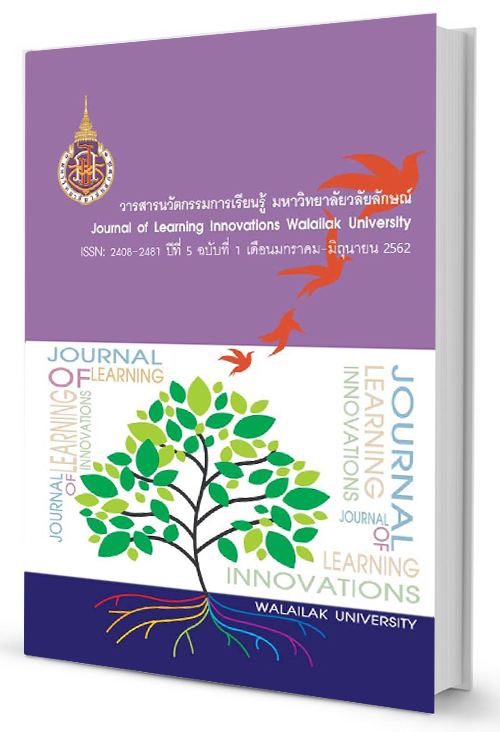Grade 11 students ’scientific argumentation learned using argument-driven inquiry in chemistry laboratory
DOI:
https://doi.org/10.14456/jli.2019.2Keywords:
Scientific argumentation, Chemistry laboratory, Inquiry learningAbstract
Scientific argumentation is an ability to construct, oppose and improve the claim with supportive evidence and reasoning as means of leading to acceptable knowledge creation. To help students learn scientific argumentation in chemistry laboratory, a teacher needs to pose situational question which bring about the argumentation issue. Students are provides with an opportunity to do an experiment to answer such a question and construct their own claims which are supported by empirical evidence. In addition, communication between groups of students who have different ideas can lead students to draw a correct conclusion together. The purpose of this study was to examine students’ scientific argumentation in chemistry laboratory learned using argument-driven inquiry. The participants were 31 grade 11 students who studying in a school in Khon Kaen. The scientific argumentation test was used as main data source to assess as pretest and posttest. Results showed that most students could improve their scientific argumentation level from fair to excellent level. Moreover, they also developed all components of scientific argumentation; claim, evidence, counter claim, and supportive argumentation. In conclusion, argument-driven inquiry in chemistry laboratory which is an instructional model could improve scientific argumentation.
References
Bybee, R. (2008). Scientific literacy, environmental issues, and PISA 2006: The 2008 Paul F-Brandwein lecture. Journal of Science Education and Technology, 17(6), 566-585.
Cavagnetto, A. (2010). Argument to foster scientific literacy: A review of argument interventions in K-12 science contexts. Review of Educational Research, 80(3), 336-371.
Chaimongkol, P., Chanunan, S., & Klamtet, J. (2017). Kānphatthanā khwāmsāmāt nai kānhai hētphon chœ̄ng witthayāsāt rư̄ang parimān sān samphan dōi kānčhatkān rīanrū dūai rūpbǣp kān sư̄pso̜ thī khapkhlư̄an dūai konlawithī kān tōyǣng [Development of scientific reasoning ability in stoichiometry unit using argument-driven inquiry instructional model]. Journal of Research Unit on Science, Technology and Environment for Learning, 8(1), 27-40.
Chen, H. T., Wang, H. H., Lu, Y. Y., & Hong, Z. R. (2016). Using a modified argument-driven inquiry to promote elementary school students’ engagement in learning science and argumentation. International Journal of Science Education, 38(2), 170-191.
Chinn. C., & Malhotra, B., (2002). Epistemologically authentic inquiry in school: A theoretical framework for evaluating inquiry tasks. Science Education, 86(2), 175-218
Dawson, G. J. (2010). The impact of a classroom intervention on grade 10 students’ argumentation skills, informal reasoning, and conceptual understanding of science. Journal of Research in Science Teaching, 47(8), 952-977.
Dukerich, L. (2015). Applying modeling instruction to high school chemistry to improve students’ conceptual understanding. Journal of Chemical Education, 92(8), 1315-1319.
Erduran, S., Ozdem, Y., & Park, Y. G. (2015). Research trends on argumentation in science education: A journal content analysis from 1998-2014. International Journal of STEM Education, 2(1), 1-12.
Issara, P., & Chuchat, A. (2015). Phonkānchai rūpbǣp kān rīan kānsō̜n sư̄p sō̜p bǣp mī kān tōyǣng rūam kap theknik kān rīanrū bǣp rūammư̄ thīm phīlō̜ tō̜ phon samrit thāngkān rīan khēmī læ khwāmsāmāt nai kānhai hētphon chœ̄ng witthayāsāt khō̜ng nakrīan matthayommasưksā tō̜n plāi rōngrīan witthayāsāt phūmiphāk [Effects of using an argument-driven inquiry instructional model with cooperative learning techniques on chemistry learning achievement and scientific reasoning abilities of upper secondary school students in the regional science schools]. An Online Journal of Education, 10(2) 249-260.
Jantarakantee, E. (2016). Kānčhatkān rīan kānsō̜n phư̄a songsœ̄m thaksa kān tōyǣng nai chan rīan witthayāsāt [Instruction for promoting argumentation skill in science classroom]. Journal of Yala Rajabhat University, 11(1), 217-232.
Kulatunga, U., Moog, R., & Lewis, J. (2013). Argumentation and participation patterns in general chemistry peer-led sessions. Journal of Research In Science Teaching, 50(10), 1207-1231.
Lee, M. H., Wu, Y. T., & Tsai, C. C. (2009). Research trends in science education from 2003 to 2007: A content analysis of publications in selected journals. International Journal of Science Education, 31(15), 1999-2020.
Lin, S. S., & Mintzes, J. (2010). Learning argumentation skills through instruction in socioscientific issues: The effect of ability level. International Journal of Science and Mathematics Education, 8(6), 993-1017.
Sampson, V., & Walker, J. (2013). Argument-driven inquiry as a way to help undergraduate chemistry students learn how to construct arguments and engage in argumentation during a laboratory course. Journal of Research in Science Teaching, 50(5), 561-596.
Suppe, F. (1998). The structure of a scientific paper. Philosophy of Science, 65(3), 381-405.
Tuba, D., & Sedat, U. (2015). Investigating the effect of argument-driven inquiry in laboratory instruction. Educational Sciences: Theory & Practice, 15(1), 267-283.
Walker, J., Sampson, V., & Zimmerman, C. (2011). Argument-driven inquiry: An introduction to a new instructional model for use in undergraduate chemistry labs. Chemistry Education Research and Practice, 88(8), 1048-1056.
Downloads
Published
How to Cite
Issue
Section
License
เนื้อหาและข้อมูลในบทความที่ลงตีพิมพ์ในวารสารนวัตกรรมการเรียนรู้ มหาวิทยาลัยวลัยลักษณ์ ถือเป็นข้อคิดเห็นและความรับผิดชอบของผู้เขียนบทความโดยตรง ซึ่งกองบรรณาธิการวารสาร ไม่จำเป็นต้องเห็นด้วย หรือร่วมรับผิดชอบใดๆ
บทความ ข้อมูล เนื้อหา รูปภาพ ฯลฯ ที่ได้รับการตีพิมพ์ในวารสารนวัตกรรมการเรียนรู้ มหาวิทยาลัยวลัยลักษณ์ ถือเป็นลิขสิทธิ์ของวารสารนวัตกรรมการเรียนรุ้ มหาวิทยาลัยวลัยลักษณ์ หากบุคคลหรือหน่วยงานใดต้องการนำทั้งหมดหรือส่วนหนึ่งส่วนใดไปเผยแพร่ต่อเพื่อกระทำการใดๆ จ้อต้องได้รับอนุญาตเป็นลายลักษณ์อักษรจากวารสารนวัตกรรมการเรียนรู้ มหาวิทยาลัยวลัยลักษณ์ก่อนเท่านั้น


